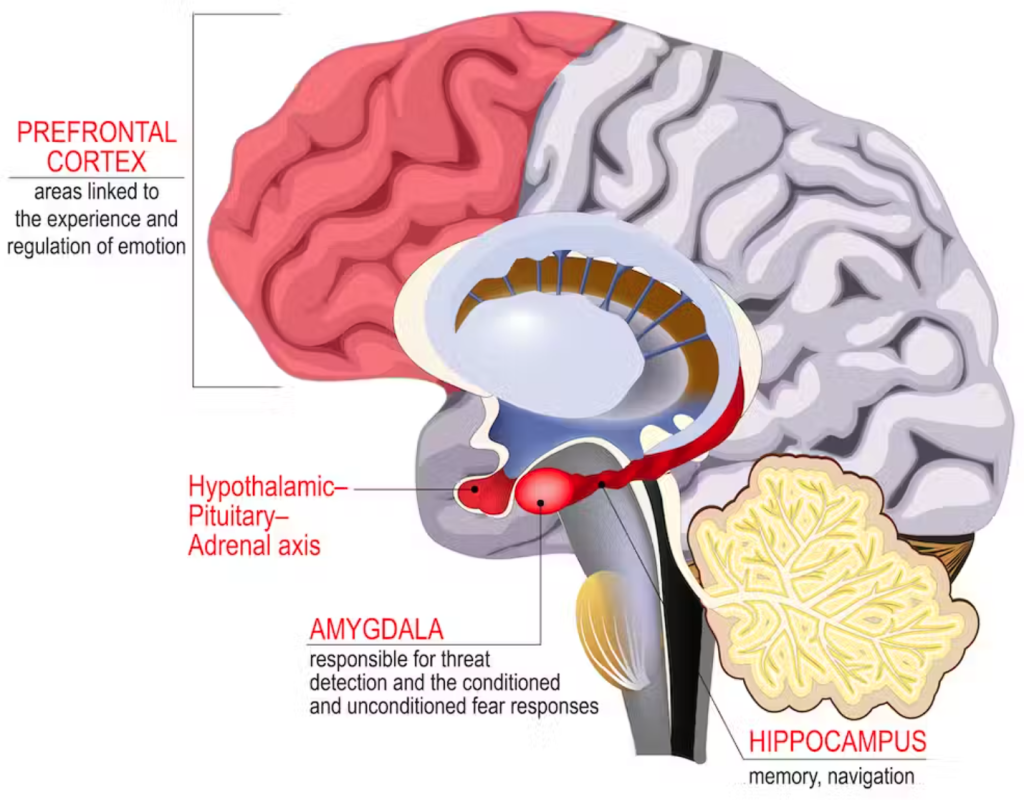
Just as the transition to shorter days and colder weather can trigger fluctuations in mood and other emotional hurdles, the holiday season can also lead to somewhat predictable shifts in mood and behavior.
During this season, many of us encounter elevated levels of stress, anxiety, and frustration. These stressors have been associated with increased rates of heart failure and alcohol poisoning, as well as a rise in stroke-related deaths.
Gaining the ability to identify the triggers of stress and understanding which areas of the brain are actively engaged can aid in effectively managing the stress response.
Being a neuroscientist, I frequently explore the intricate link between behavior and the brain. Biologically, there are methods to navigate and control responses to holiday stressors by understanding the reasons behind their occurrence.
Harnessing the hypothalamus
Travel disruptions, congested airports, and crowded highways can effortlessly result in challenges for individuals on the move, especially those journeying to spend time with family or friends.
The hypothalamus, a deep-seated brain structure, plays a crucial role in responding to these types of stresses. It is responsible for maintaining the body in a stable state, known as homeostasis.
The hypothalamus plays a role in regulating the autonomic nervous system, which coordinates involuntary responses such as heart rate, blood pressure, and respiration. It serves as a central component of the fight-or-flight response to real or perceived threats.
During stressful situations, like discovering your flight has been delayed or canceled, the hypothalamus initiates the release of stress hormones like cortisol and epinephrine. These hormones, in turn, induce physiological reactions such as heightened heart rate, perspiration, and the experience of irritation and frustration.
When facing these stressors, practicing deep breathing exercises can stimulate the body’s parasympathetic nervous system. This system, also known as the “rest and digest” system, aids in helping your body relax and recover from stress. Taking slow, deep breaths can activate the parasympathetic nervous system, effectively helping to calm your nerves and alleviate frustrations.
Family dynamics and interactions
Reuniting with family during the holiday season can evoke complex emotions, especially in the presence of conflicting personalities, unresolved issues, or awkward family dynamics.
Challenging or vexing conversations with family members often activate a brain region known as the anterior cingulate cortex. Positioned uniquely in the brain, the anterior cingulate cortex establishes connections with both the “emotional” limbic system and the “cognitive” prefrontal cortex.
This brain region actively participates in overseeing and regulating cognitive processes, resolving conflicts, and detecting errors. It contributes to processing frustration by signaling when there is a conflict between expectations and outcomes. Additionally, the anterior cingulate cortex is integral to what is termed action-outcome learning, where individuals assess the consequences of an action and adjust their behavior based on feedback.
When you feel overwhelmed or frustrated, taking brief breaks to step away from the situation can offer a renewed perspective and enable you to return with a clearer mindset. These breaks help reinforce action-outcome learning, allowing you to associate an action – a short break – with the outcome of more relaxed breathing and a clearer mind.
Financial worries
The holiday season may impose an unwarranted burden on individuals facing economic or financial challenges. The expenses associated with hosting a holiday meal, purchasing gifts, or traveling can add to the financial strain during an already stressful period.
The primary center associated with memory and learning is the hippocampus in the brain. When recalling past experiences, such as holiday spending last year or remembering an upcoming credit card bill, the hippocampus is activated. It plays a crucial role in the interaction of memory formation, recall, and retrieval of individual episodic memories.
To alleviate stress, consider crafting gifts for friends and family instead of buying them. To reduce travel expenses, you might opt for a virtual holiday visit now, reserving an in-person visit for a later, less costly time, or when financial pressures have eased.
When prompted by stressful experiences, the hippocampus signals the hypothalamus and other brain regions to restore balance in your mind. Additionally, the hippocampus plays a role in your adaptation to these stressors by assisting you in learning how to manage your expectations. Ultimately, it’s crucial to remind yourself that the thought behind actions is what matters most.

Emotions of isolation and loneliness may surface for individuals who lack family or friends to celebrate with or those who are unable to travel to be with their loved ones.
The “default network” of the brain comes into play in situations like these. Comprising brain regions, including the amygdala, this network is engaged in activities such as future planning, reminiscing, and imagining. The amygdala, a component of the limbic system, is linked to the processing of negative emotions in response to stimuli, such as the frustration arising from travel limitations, and influences your reactions.
Research indicates that maintaining a regular exercise routine can contribute to improving mood and reducing feelings of frustration and irritation. Engaging in physical activity serves as an effective outlet for releasing accumulated tension and stress. Furthermore, aerobic exercise has the potential to modulate connections between and within the amygdala, offering relief from depressive feelings.
As an additional benefit, exercising in a gym or park provides an opportunity to be in the company of others, fostering a sense of connection with communities of people who share similar interests.
Political discussions
Family gatherings may involve discussions about current events or politics, leading to intense debates and disagreements among family members. These conversations can be highly frustrating and even upsetting, especially in today’s polarized world.
The prefrontal cortex is a region of the brain involved in impulse control, decision-making, and emotional regulation. It plays a crucial role in assessing specific situations, such as intense conversations, helping you evaluate and contemplate potential actions while tempering emotional responses. Understanding the triggers for frustration in these scenarios is essential for developing proactive strategies to manage or avoid them.
For example, this could involve empathizing with the opposing side or taking a step back from the conversation when voices begin to rise or you sense your emotions escalating.
The prefrontal cortex plays a dual role in regulating the interplay between your initial emotional reaction and the transition to your empathetic response. Enhancing your ability to cultivate empathetic perspectives and improve cognitive control contributes to the continued development of your prefrontal cortex, potentially making it easier to de-escalate in similar situations in the future.
One step at a time
Minimizing frustration is a gradual process, and various strategies prove effective for different individuals.
Identifying the underlying cause of your stress and frustration is crucial for developing personalized coping strategies. Examples include pursuing a hobby, enjoying music, taking a walk or run, or practicing relaxation techniques. It’s essential to experiment with different methods and be open to transitioning from those that prove ineffective to those that yield positive results.
Remember that reshaping your brain is a gradual process, akin to a marathon rather than a sprint. It involves trial and error, requiring openness to experimentation. By focusing on recognizing your triggers and adapting personalized coping strategies, improvements are likely to occur over time.
This article is republished from The Conversation under a Creative Commons license.





